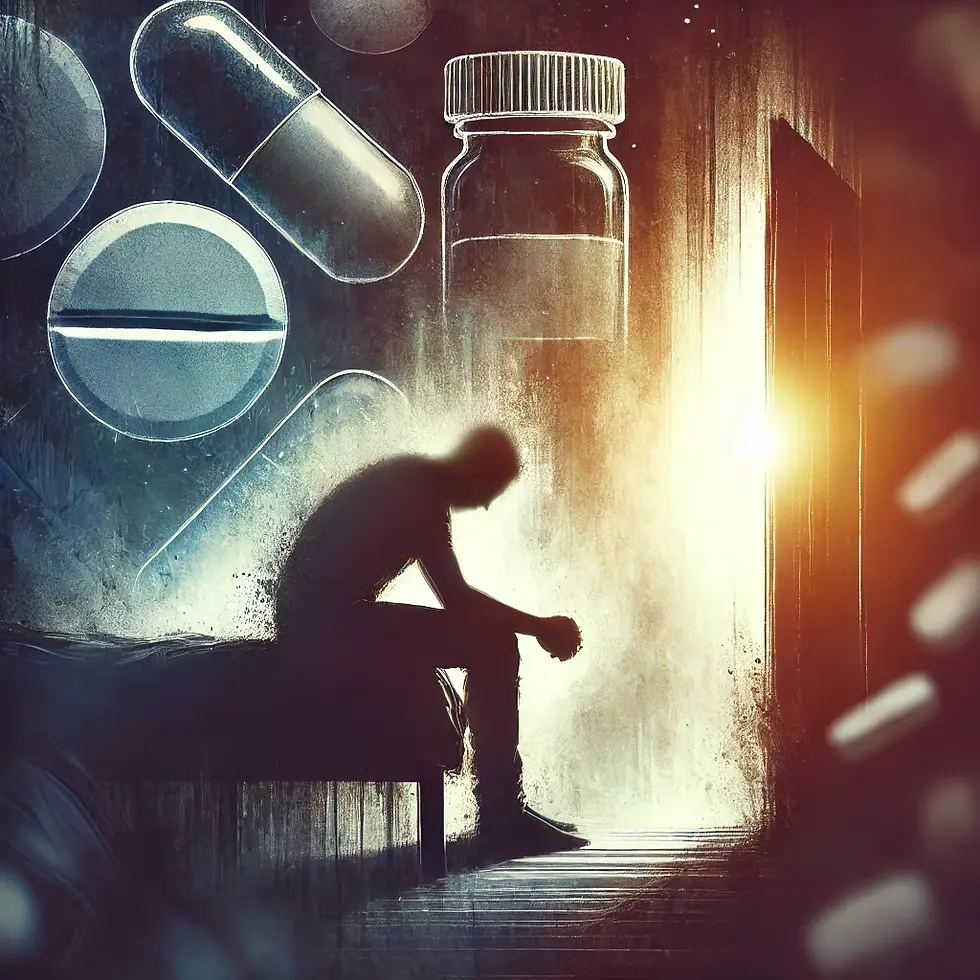The Connection Between Depression and Substance Abuse
- Jason Galdo
- Sep 23, 2024
- 3 min read

Depression and substance abuse often occur hand in hand, creating a vicious cycle that can be difficult to break. The relationship between these two conditions is complex, and understanding it is crucial for both prevention and treatment. In this blog, we will explore how depression can lead to substance abuse, the impact of these intertwined conditions on an individual’s life, and the importance of seeking help.
Many people struggling with depression turn to substances like alcohol, prescription drugs, or illegal substances as a way to cope with their overwhelming emotions. This form of self-medication may provide temporary relief from the symptoms of depression, but it ultimately exacerbates the problem.
Depression makes individuals more vulnerable to addiction because of their desperate need to escape feelings of sadness, hopelessness, and despair. Substance abuse can initially mask these emotions, but over time, it worsens the mental health symptoms. Studies show that people with depression are more likely to misuse drugs and alcohol, increasing the risk of dependency.
The Vicious Cycle
When someone is battling both depression and substance abuse, they find themselves trapped in a cycle of destructive behavior. Depression can lead to substance abuse, and substance abuse can, in turn, deepen the depression. The temporary relief offered by drugs or alcohol is short-lived, and when the effects wear off, the feelings of sadness, guilt, and shame often return even stronger. This can lead to an increase in substance use, creating a downward spiral that is hard to escape.
In addition to worsening depression, substance abuse can also cause or aggravate other mental health conditions like anxiety or bipolar disorder. These co-occurring disorders often complicate the recovery process, making it vital for individuals to receive comprehensive treatment that addresses both the mental health and substance abuse aspects of their condition.
The Impact on Relationships and Daily Life
The combination of depression and substance abuse can have devastating effects on an individual’s personal and professional life. Relationships with family and friends often become strained or broken as a person becomes more isolated and consumed by their struggles. Work and academic performance typically suffer as well, leading to potential job loss, financial difficulties, or academic failure.
Depression and substance abuse can also take a severe toll on physical health. Substance misuse weakens the immune system, increases the risk of accidents, and can lead to life-threatening conditions like liver disease, heart problems, and overdose. Additionally, individuals who struggle with both conditions may be at an increased risk of self-harm or suicide.
Breaking the Cycle: The Importance of Treatment
Seeking help is the first and most important step toward breaking the cycle of depression and substance abuse. Treatment for these co-occurring conditions must address both issues simultaneously to be effective. Therapy options such as Cognitive Behavioral Therapy (CBT), Dialectical Behavior Therapy (DBT), and other behavioral therapies are widely used to treat depression and addiction together. In addition to therapy, medication such as antidepressants or mood stabilizers may be prescribed to help regulate mood and alleviate the symptoms of depression.
Support groups and rehabilitation centers play a crucial role in the recovery process. These resources provide individuals with a safe, supportive environment to work through their mental health and addiction issues. Joining a support group helps reduce isolation, fosters a sense of community, and provides a network of people who understand the struggles of both depression and substance abuse.
For long-term success, it’s essential that individuals create healthy coping mechanisms and avoid the triggers that lead to substance use. Establishing a strong support system, practicing mindfulness techniques, and staying connected to mental health professionals are critical components of maintaining sobriety and mental wellness.
A Path Toward Healing
Depression and substance abuse are challenging battles, but recovery is possible with the right support and treatment. It’s important for anyone struggling with these conditions to know that they are not alone, and help is available. Whether through therapy, rehabilitation centers, or support groups, there are numerous ways to begin the journey toward healing.
By addressing both depression and substance abuse together, individuals can break free from the vicious cycle and take back control of their lives. Recovery is not easy, but it is always worth the effort for a healthier and more fulfilling future.
If you or a loved one are struggling with mental health issues, please give us a call today at 833-479-0797.




Comments